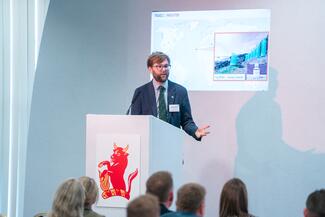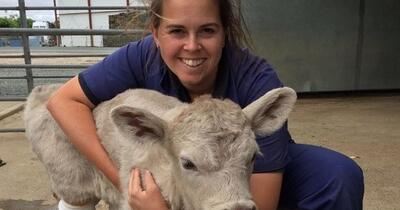
Cambridge-based environmental consultant Dr Tom Young NSch 2022 has published his Nuffield Farming report entitled ‘Sustainable Water Use: Opportunities for Agriculture Based on Cross Disciplinary Knowledge Sharing?’, sponsored by The Worshipful Company of Gardeners.
The full report is now available on the Nuffield Farming report library and his report video is available on the Nuffield Farming YouTube channel. Tom presented the findings of his report at the 2023 Nuffield Farming Conference in Exeter. A recording of his presentation is available here.
As part of his Scholarship, Tom travelled to the UK, Greece, Israel, the USA, the Canary Islands, Spain, Singapore, Australia, and New Zealand. He investigated the methods and technologies used to reduce water consumption, use water more efficiently and source water from alternative sources.
“UK water security is now a real concern. Water security is a key challenge for any country and is defined as the ability to provide a resilient water supply for all users in the long term,” says Tom in his report.
Tom visited countries which have already experienced significant water stress, and therefore have been forced to develop solutions to the problem.
“Alternative water security solutions observed on my travels included use of treated wastewater either directly or to recharge ground aquifers; large scale rainwater harvesting; use of satellite and sensors to inform irrigation regimes; water efficient irrigation such as sub-surface drip; crop breeding to improve water efficiency; desalinated water; supply chain water resilience management; and holistic landscape level soil management.”
However, he notes that all of these solutions have multiple barriers preventing their uptake in the UK including the financial risk of investment; stakeholder resistance to change; lack of industry knowledge on alternative technology; regulation restricting innovation; challenges of inter-disciplinary working; and a low support for long-term planning.
“I observed many examples of stakeholders overcoming these barriers to implement water resilient projects. Prevailing patterns among these success stories include stakeholders driving projects forward; support and long-term planning from government; inter-disciplinary working; and local ownership of problems.
“Given the complexity of the issue, addressing the issue of water security in the UK demands a multifaceted approach. None of these solutions will be straightforward to implement and will necessitate significant shifts in our perspectives and long-term strategies for the management of water resources.”
Study objectives
- Observe the variety of methods and technologies used to reduce water consumption, use water more efficiently and source water from alternative sources.
- Understand common barriers preventing uptake of these methods and technologies in different industries, and potential solutions for overcoming these barriers in the UK.
Messages
- The UK will experience water stress on a much more regular basis in the future, particularly in the South and East.
- Agriculture, horticulture, amenity, and landscape are all vulnerable to water shortages and need industry-wide change to become water secure.
- Multiple solutions exist to improve UK water security.
- These include alternative water sources, technology to improve irrigation, catchment wide land management, as well as empowering and supporting local water groups.
- The UK must change its management of water to adapt these alternative approaches. The current system is too restrictive for innovation and change.



